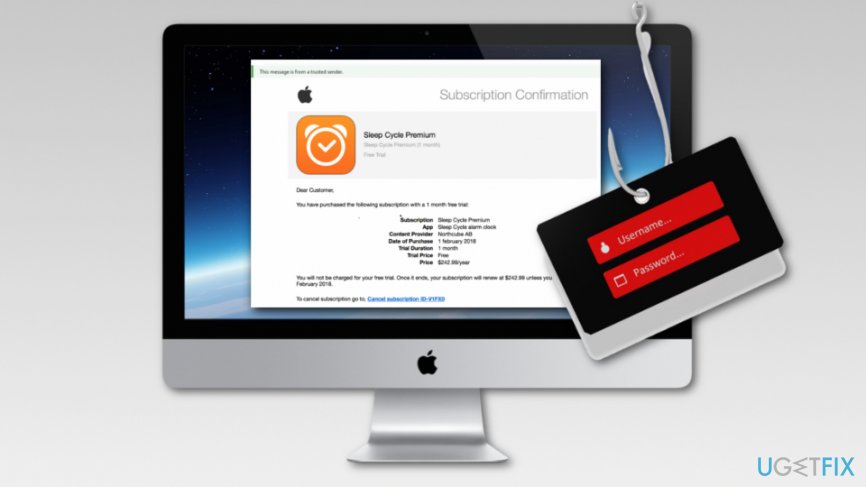Apple scam emails inform about confirmed expensive app subscription

The technology company Apple warns users about new phishing scams[1] that are spreading via email messages. Scammers created a legitimate looking subscription confirmation emails from App Store.[2]
Scammers want to scare people that they have purchased a very expensive subscription of Sleep Cycle Premium or YouTube Red apps. While YouTube Red is charged for $149.99 per month, the yearly subscription of Sleep Cycle Premium is $242.99. It goes without saying that these prices are extreme.
However, it’s quite a clever trick. Users who are not willing to purchase such expensive apps migh rush to click “Cancel subscription” link which leads to a phishing website.
Scammers created a convincing copy of the Apple’s website. Hence, unsuspecting customers may not recognize the hoax and reveal sensitive information to criminals. The phishing site asks to enter Apple ID, password, credit card information and similar details.
The number of Apple scams keep growing
Apple App store scam is one of many recently reported hoaxes aiming at Apple customers. Similar phishing emails were sent from fake iTunes Store,[3] iBook Store or Apple Music. People received fake subscription confirmation emails where they learned about purchasing expensive apps.
However, there are many other Apple scam emails that trick users about various problems and issues, such as:
- unauthorized login to the account;
- becoming a victim of data breach;
- various account problems;
- violated policies;[4]
- disabled or suspended account;[5]
- order receipt or invoice which include “Cancel subscription” or “Cancel and manage subscriptions” button.
The purpose of all these scams is to get user’s login details and credit card information. The problem is that scammers create phishing emails that look nearly identical to Apple’s. However, users have always check sender’s email. Logging in directly to the iTunes, App store and other accounts are also recommended. It’s better to stay away from links in tricky emails.
Tips to spot Apple App Store scam
Phishing emails might seem hard to identify. Scammers use Apple’s logo, color scheme and sometimes even use @apple.com ending of the email. However, the company provides all the needed help to identify phony emails. Nevertheless, it might be difficult; the important thing is that it’s still possible.
- Emails from Apple typically start with your name, but not with a “Dear customer” address.
- Subscription confirmation emails include your billing address which cannot be added by scammers.
- If you received a confirmation email about a purchased app, go to the Apple App Store and check payment history. If the information does not match, it means that someone is trying to scam you.
- Apple never asks to enter Social Security Number, credit card number or CCV code in the email.
- Never click on a link provided in the suspicious email. Access the website directly in order to avoid entering login details and other sensitive data on a phishing website.
- Emails from Apple do not include attachments.
If you think that you may have fallen for Apple scam, you should change your Apple ID password immediately.
- ^ Identify legitimate emails from the App Store or iTunes Store. Apple Support. The official website.
- ^ Ben Stegner. How to Spot and Avoid the New Apple App Store Phishing Scam. MakeUseOf. The guide in modern tech.
- ^ Harley Tamplin. Here’s how to tell if your iTunes invoice is a scam. Metro. News website.
- ^ Brett M. Christensen. Apple ID ‘Information Missing or Invalid’ Phishing Scam. Hoax Slayer. The website critically analyzes the veracity of urban legends.
- ^ Katie Pelton. Call for Action Alert: Scam email warns your Apple ID is disabled. KKTV. News website.



